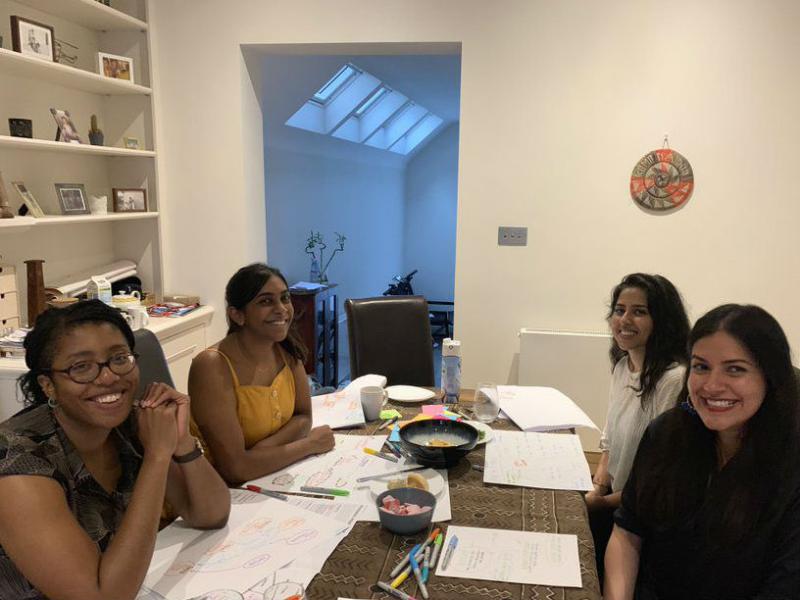05 May 2020
Thinking and talking about money was hard for women before the COVID-19 pandemic. For many women it’s just got a whole lot worse. It may feel overwhelming to think beyond the anxiety of the next month’s rent, when a universal credit payment will finally come through, or how debts will ever be repaid.
Women are bearing the brunt of the crisis, suffering heavier job losses and experiencing immense pressures at home. And for some women, isolation measures increase the chance of an abusive partner controlling their economic situation. (Surviving Economic Abuse has some resources that can help).
To empower women to take control of their finances and make a difference to the environment, we're launching a new online cohort of Own It, our pilot programme using the power of peer networks to support women to take climate action with their money.
So why are we launching this now, and why should you be part of it?
5 reasons why now is the right time
1. Build financial resilience
As a woman you may be facing big financial challenges. Women are more vulnerable to financial shocks – and as climate risks become more severe, we know that there will be more coming. This crisis may have wiped out any savings you had. If so, where do you go from here? Do you need to rethink your assumptions about the risks you need to plan for?
Tackling this might feel impossible right now, but these questions won’t go away. Channelling energy and time – however scarce – into practical action in a supportive setting could also be a good way to tackle these anxieties head on.
“From ‘F*** off funds’ to ‘pandemic pots’ – the need to build up long-term buffers has never been greater.” Good Money Girl on Good with Money, April 2020
2. Stop funding destruction
Our current health and economic crises have revealed how inter-connected, and how vulnerable we all are. But the mainstream banks are still funding destruction, with £2 trillion invested in the fossil fuel industry’s growth since 2016. UK banks Barclays and HSBC are the worst offenders in Europe. Now is the time to send the message to your bank that there is no back to ‘normal’ for the planet.
"Commercial banks continue to finance emissions that will generate warming exceeding 4°C. If they persist in pouring money into new fossil fuel development, we will have no chance to stave off the worst of the climate crisis." Anna Vickerstaff, 350.org (Funding Climate Chaos report, April 2020)
3. Make local climate-friendly connections
It takes approximately eight weeks to form a new habit. Changes made during the course of lockdown have a good chance of sticking, if we let them. Making change with your money isn’t just about savings and investments, it’s also about everyday spending and giving. So, if you’ve felt a stronger sense of local connection and have built new ties, this could be a good time to embed them in your spending habits.
Maybe you could reflect on how you could make your charitable giving do more and go further? Maybe you’d like to think about how you can use your spending to help your local high street recover? Think of how you could collaborate with your neighbours.
Could you start a food-buying co-op, for example, or create a micro mutual-aid pot? The good news is that actions like this can be very empowering and break the link between consumption and personal identity.
4. Sustainable investments are doing better
The oil price has collapsed during the outbreak. People whose pension funds include fossil fuel holdings (that’s most of us) will also have seen a big drop in value of their future pot. But the average losses from more responsible funds (even though many still won’t be fossil fuel free) are around half that registered by "conventional" competitors.
What’s more, our friends at Good with Money have just published a new Good Guide to Investing for Women, with Energise Africa and EQ Investors to make it easier.
5. Help us test our assumptions
We think that small face-to-face groups are key to building a safe space for a difficult issue and the commitment to the group that turns good intentions into action. But sadly, that’s not possible at the moment. However, we are committed to a test-and-learn approach.
So, we will be using this opportunity to explore our hosts’ and participants’ experiences to understand whether the same sense of mutual support and obligation can be built online. We’ll also be making some revisions to our core materials to support the change in context.
Take part in Own It
In the coming months we’ll be recruiting women to take part in our first digital Own It cohort. They’ll go through a short training programme on how to host informal peer-learning sessions. They’ll then run three of their own sessions (think coffee shop, not seminar) supporting friends, colleagues, and neighbours to get informed and start making changes – all done digitally.
This is a chance to shape what the future of the project could look like, learn some new skills and trial a new way of taking action in an online context. If you’d like to join us on this journey, or want to find out more about what’s involved, let us know through our contact form.
This is a scary and challenging time. But one way to get through is to make connections, share experiences and plan to build back better.
A previous participant in the programme said “I have felt hugely empowered and excited by these sessions so far. They have provided just the push I needed at the right moment. It's dramatically changed how I think and communicate about money”.
Now is the time to help each other get back on our feet and move towards the future we want to see.


